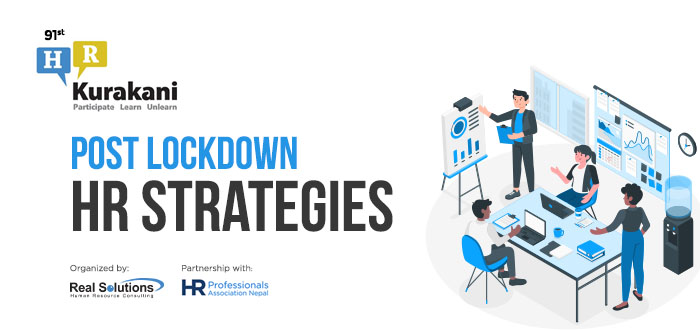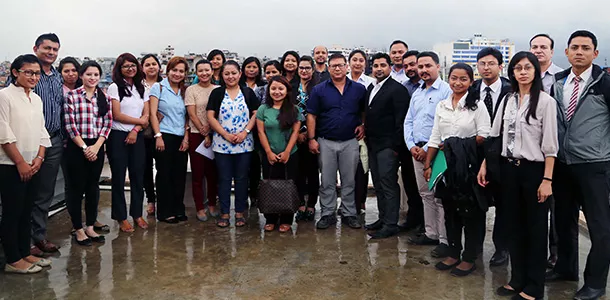
Post-Lockdown HR Strategies
Category: HR Kurakani | Date: May 19, 2020, 10:10 a.m. | Total Views: 1839
HR Kurakani, an open platform for learning and sharing has successfully completed its 91st edition focused on the topic "Post Lockdown HR Strategies” on May 18, 2020. The Virtual HR Kurakani was attended by 150+ HR Professionals from various organizations in Nepal. It was moderated by Ms.Rashmi Kharel, HRPAN, co-moderated by Mr.Amit Sharma, HRPAN, and a resource person was by Mr. Debashish Hait, HR Head - Surya Nepal.
In the past few months, the world as we knew has changed drastically and dramatically due to the surge of the novel COVID-19. No longer just a global health crisis, the pandemic has been the catalyst to major labor issues along with economic crises. How so much it has impacted the lives of the employees, in the same magnitude it has impacted the roles and responsibilities of the management and the HR department of organizations.
How will a company recuperate order after the lockdown? How will an HR team motivate its employees to bounce back into action hence? These are some important questions worth pondering upon as it is a testing time for HR teams all over the world.
There are many challenges that the HR department has to face as the aftereffect of COVID 19. HR needs to closely work with the management to understand business continuity and make succession plans accordingly. Making a way for flexible workforce management might be another challenge for HR since questions about overhead cost-cutting might follow. The management and HR together must work towards workforce rationalization as well by assessing the need and contribution of a job to the continuity of business. HR will need to manage and make plans for effective work from home implementation which will give rise to the issue of employee communication as well. Employee engagement is another area to focus on while working remotely. During and after the pandemic there will be an upswing in employee concerns and issues. Hence, welfare policies and workplace policies need to be revisited. These policies need to adhere to the changing work environment.
The HR Kurakani session discussed the Five "R" Strategy to follow post lockdown, mentioned below:
- Reflect: Companies hereon need to weigh their decisions and actions taken during the pandemic surge and learn from it. The gaps seen in the responses must be assessed for opportunities and improvements.
- Recommit: By this time, the workforce in the companies will have lost much of their faith and hope of positive outcomes. Hence, it is for the HR team to recommit to the workforce and make sure that they feel heard and understood regarding their ongoing concerns and issues.
- Reengage: the management and HR teams need to think of creative ways to engage their employees to get the most contribution out of them. It makes the employee feel productive.
- Rethink: Now is the best time to rethink and create new policies and procedures taking into account the uncertain scenarios that might arise.
- Reboot: Following the days of unrest, it is important to reenergize the HR functions and operations. The businesses and workforce need to merge and pivot towards revival and exponential growth of the organizations.
Here are some of the Post lockdown HR Strategies suggested in the session:
- Developing a return to work strategy: HR will have to formulate a strategy as to how the workforce will be reintroduced to the working space after the lockdown ends. Which kind of work will require physical presence and which can be done from home should also be evaluated.
- Readjust and Realign business and HR priorities: finance is an equally important aspect for the businesses to continue after the pandemic. Hence, it is for the management and HR to reestablish the priority areas of business and cut costs in areas as required.
- Continuity planning: Businesses need to create a system of prevention and recovery in the current case and also if a similar case arises later. HR must make sure that the systems are aligned for resiliency against potential threats to the business.
- Succession plan for critical roles: In the worst-case scenario, HR must pre-plan the second line of the workforce who will operate the business in the absence of their supervisors. The succession planning must be done for both short and long term.
- Strategic Cost management: there can be various engagement programs set up, where the workforce itself is indulged in cost management.
- Redeployment/ Reskilling: competency mapping is of the essence to understand the gap in skills among employees. The HR department can explore the new possibilities of reskilling employees and transferring them to other divisions to meet future demands.
- Adapt to virtual learning platforms: Virtual learning can be promoted in digital forums by adapting to the new wave of change in technology.
- Promote digital operations: The HR operations can also be digitized. New communication modes can be approached.
- Develop workplace safety policies: Workplace safety policies can also be developed and implemented as per the need of the current scenario. Social distancing, protective equipment as per the job responsibility, isolation, testing body temperature, field visits, are a few safety aspects to be mentioned in these policies.
- New work culture: Working from Home can be considered as a new working culture and can be framed into a policy. As per the demand of the situation, more choice to employees must be given and the geographical boundaries can phase out.
Supporting the HR strategies mentioned, following were some of the Action Plans stated, that might be implemented:
- Learning and Development: Upskilling the employees as per the need of the business has and should be a priority area of HRM. As an immediate learning plan, learning hours can be allocated to each employee, and learning materials can be provided digitally. Various LMS (Learning Management Systems) can be utilized, free online courses (edX, Coursera, Alison, etc.) can be identified and handed over to the employee.
- Business Continuity: For the continuity of the business, the management and HR need to develop case scenarios, prevention strategies, policies, and procedures. In response to the current situation, policies, guidelines, succession planning can be done.
- Digital Operation: there has been a perceptible increase in the use of digital platforms around the globe after the COVID surge. Since most employees are active on digital platforms, it is best that companies recognize and utilize these platforms. Whether by telecommunication, using social media platforms for sharing information, e-learning, e-attendance, digital PMS systems, online task management, online onboarding systems, and tools, digital operations are here to stay.
- Administrative control policy: As per the current situation, the demand for sanitary and hygiene in the work environment will be rampant in companies. Administration and HR teams must collectively renew their health and safety policies, develop emergency protocols, provide sanitation gaps in between work shifts, make emergency communication forums, and manage essential and non-essential travel, and more.
- Return to work strategy: HR team must consult with line managers and management to decide how the new work shifts and work culture can be coordinated. Policies on Work from Home must align with the job responsibilities while working at office space must follow certain social distancing, flexibility, and relative measures.
- Focus on employee wellness: Employee wellness will be more important during this time and will see a slight change in the priority area. HR team must promote hygiene and socially responsible behavior among the workforce. Providing online fitness classes, subsidized healthy meals, stress management classes, consulting workforce against stigmatizing of COVID infected staff is few ways to engage in employee wellness.
While the above-mentioned post lockdown HR strategies and actions can very well be taken into reference, the strategies will differ as per the industry and business structure. Companies must very well take into consideration the past work culture experience of the employee that they will have to forgo to adapt to the changes.
There are certainly many unannounced problems arising due to the pandemic but these problems have morphed as opportunities for some individuals and businesses. Companies can go on to turn the tides of uncertainty and volatility by analyzing and reallocating their resources accordingly. They can increase their agility and be open to new perspectives and interpretations of the situation to be resilient hereon.



